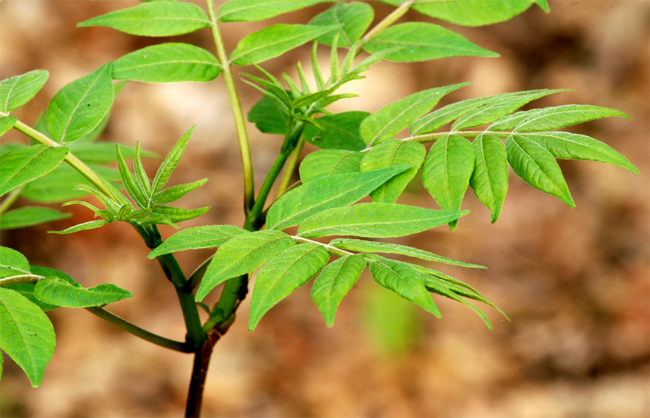
We present you one of the 50 fundamental herbs in Chinese alternative medicine – Phellodendron amurense. It is also called the Amur velvet tree. Apart from its fragrant fruits and beautiful yellow leaves in autumn, the tree is known for its help in solving a number of health problems.
What is Phellodendron amurense?
Phellodendron amurense is a large deciduous tree native to China, Korea and Japan. It grows and spreads extremely fast.
It is often used by traditional Chinese medicine to treat stomach upset and pain, diarrhea, affects various inflammatory processes.
Its anti-inflammatory and anti-tumor potential has been increasingly studied recently.
What does Phellodendron amurense extract contain?
For medical purposes, alcohol or aqueous extract of the dried bark of the tree is used.
The main carrier of the biological activity of Phellodendron amurense is berberine, which has anti-tumor, anti-inflammatory and anti-diabetic effects.
Felodendrin, protoberberin, palmatin, magnoflorin are other ingredients that are believed to contribute to the action of Phellodendron amurense extract.
A curious fact is that in addition to influencing suffering, the bark of Phellodendron amurense is used as a starting material for the production of cork, and the fragrant fruits of the tree – for paints, soaps and lubricants.
Proven benefits in humans:
Weight loss:
- Appetite Suppression: Healthy overweight women aged 20 to 50 who ate more during stress were included in a randomized, double-blind study receiving Phellodendron amurense extract for 6 weeks. . The control group did not receive the herb. At the end of the study, women not taking Phellodendron amurense showed significant weight gain, unlike others who did not show weight change. In addition, a decrease in morning levels of cortisol, considered the main stress hormone, was measured. These results suggest the possible use of Phellodendron amurense in stress-related overweight.
- In another similar study, it measured in addition to the change in weight and triglyceride and cholesterol levels in normal and overweight people compared to a placebo-treated control group. A marked weight reduction of up to 5% was reported for 8 weeks in overweight. For both groups, there was a marked decrease in lipids, as well as the level of fasting blood sugar in those who were overweight.
Anti-inflammatory effect:
- In patients with primary osteoarthritis of the knee joint, the anti-inflammatory effect of Phellodendron amurense extract was monitored for 8 weeks. The results show a reduction in markers of inflammation and a reduction in the symptoms of osteoarthritis.
Proven benefits in laboratory animals:
Anti-inflammatory effect:
- The effect of Phellodendron amurense extract on human articular cartilage affected by osteoarthritis has been observed – the extract prevents the destruction of both cartilage cells (chondrocytes) and collagen and proteoglycans in the cartilage, which leads to delayed osteositis.
- In mice with monoarthritis, the biochemical chain of berberine, the main component of Phellodendron amurense extract, has been broken.
- The effect of both acute and chronic phases of inflammation on Phellodendron amurense has been demonstrated in animal models. In these experiments, the effect of the alcoholic extract of Phellodendron amurense was close to that of the corticosteroids known as very effective anti-inflammatory drugs .
Antidiabetic effect:
- Experiments following the antidiabetic effect in mice of berberine and Phellodendron extract have shown an effect on symptoms and a reduction in blood sugar levels.
- Other studies have established the mechanism of this effect – on the one hand, the process of glucose formation in the liver is blocked (gluconeogenesis), the insulin- producing structures (Langerhans’ islands) are protected .
- Contributing to lowering blood sugar is the stimulation of non-insulin-dependent biochemical pathways for glucose uptake.
Metabolic effects:
- In experiments on mice, a hepatoprotective effect of the extract and regulation of cholesterol synthesis by the liver was found.
Antitumor effect:
- Based on the hypothesis that tumor diseases are the result of gene mutations, the effect of the herb on various genes responsible for tumorigenesis has been observed. In these experiments, it was found that it is possible to use the extract for the treatment of tumors.
Side effects and contraindications:
Oral administration of Phellodendron amurense extracts is well tolerated, but there are insufficient convincing data on its safety, especially during pregnancy and lactation.
What doses are recommended and how is it taken?
The appropriate dose is determined after extensive study of the effects and depends on factors such as age and health.
Although there is insufficient convincing evidence to determine the optimal dose, it is usually recommended to take 250-500 mg twice daily with meals.
In which sports and health supplements can we find it?
The extract of the herb is included in the content of some nitrogen boosters, non-drugs to reduce stress and appetite, as well as those with anti-inflammatory action.


